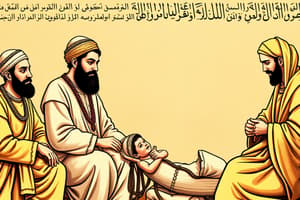Podcast
Questions and Answers
Di mana Muhammad menghabiskan sebagian besar masa kecilnya setelah menjadi yatim?
Di mana Muhammad menghabiskan sebagian besar masa kecilnya setelah menjadi yatim?
- Di bawah perawatan kakeknya (correct)
- Di bawah perawatan ibunya
- Di bawah perawatan ayahnya
- Di bawah perawatan pamannya
Apa yang membuat ajaran Muhammad berbeda dari kepercayaan politeisme yang ada pada zamannya?
Apa yang membuat ajaran Muhammad berbeda dari kepercayaan politeisme yang ada pada zamannya?
- Pengenalan konsep monoteisme (correct)
- Penolakan terhadap segala bentuk kepercayaan
- Pengenalan konsep reinkarnasi
- Pengenalan konsep politeisme baru
Apa yang membuat Muhammad memulai pengalaman mistis dan wahyu ilahi di sekitar usia 40 tahun?
Apa yang membuat Muhammad memulai pengalaman mistis dan wahyu ilahi di sekitar usia 40 tahun?
- Saat menemani pamannya berdagang
- Saat menggembalakan domba (correct)
- Ketika bekerja sebagai pedagang
- Ketika bekerja sebagai petani
Bagaimana warisan Nabi Muhammad mempengaruhi masyarakat muslim secara global?
Bagaimana warisan Nabi Muhammad mempengaruhi masyarakat muslim secara global?
Apa yang membuat kelahiran Nabi Muhammad memiliki signifikansi agama yang besar bagi umat Islam?
Apa yang membuat kelahiran Nabi Muhammad memiliki signifikansi agama yang besar bagi umat Islam?
Apa yang dilakukan oleh Muhammad di gunung gua Hira yang kemudian menjadi dasar bagi kitab suci Al-Qur'an?
Apa yang dilakukan oleh Muhammad di gunung gua Hira yang kemudian menjadi dasar bagi kitab suci Al-Qur'an?
Berdasarkan teks di atas, siapa yang mengasuh Muhammad setelah ibunya, Amina, meninggal?
Berdasarkan teks di atas, siapa yang mengasuh Muhammad setelah ibunya, Amina, meninggal?
Apa yang terjadi ketika Barakah, pengasuh pengganti Muhammad, menuangkan air ke dalam mulut ibunya, Amina?
Apa yang terjadi ketika Barakah, pengasuh pengganti Muhammad, menuangkan air ke dalam mulut ibunya, Amina?
Apa suku atau keluarga terkemuka tempat Muhammad dilahirkan?
Apa suku atau keluarga terkemuka tempat Muhammad dilahirkan?
Apa makna dari peristiwa terlihatnya cahaya di langit Mekah pada hari kelahiran Muhammad?
Apa makna dari peristiwa terlihatnya cahaya di langit Mekah pada hari kelahiran Muhammad?
Mengapa Muhammad dipanggil sebagai 'Nabi terakhir' dalam ajaran Islam?
Mengapa Muhammad dipanggil sebagai 'Nabi terakhir' dalam ajaran Islam?
Apa yang terjadi pada ayah Muhammad, Abd Allah bin Al-Muttalib, sebelum kelahirannya?
Apa yang terjadi pada ayah Muhammad, Abd Allah bin Al-Muttalib, sebelum kelahirannya?
Flashcards are hidden until you start studying
Study Notes
Prophet Muhammad's Birth
Prophet Muhammad, the last Prophet and final messenger of God according to Islamic beliefs, was born in Mecca, Arabia around 570 AD. His birth is celebrated on the 12th day of the lunar month of Rabīʿ al-AWwal, which corresponds to 29 August 570 in the Gregorian calendar.
Events Surrounding the Birth
Muhammad's birth was marked by significant circumstances that foreshadowed his future role as the Prophet of Islam. His mother, Amina, had taken him to Yathrib (later known as Medina) when he was still an infant to visit his father's grave. During their return journey, Amina fell ill and passed away at the village of Abwa. Muhammad was brought back to Mecca and entrusted to the care of his maternal uncle, Abu Talib, where he lived until adulthood.
On the day of his birth, a light was seen to shine from the heavens above Mecca, indicating the blessed nature of the event. Additionally, whenever his foster mother, Barakah, poured water from a flask into his mother's mouth, it miraculously transformed into milk, ensuring that Amina received nourishment despite her weakened condition.
Family Background
Muhammad was born into the most powerful tribe in Mecca, the Quraish, who held considerable wealth and political influence due to their successful merchant activities. His father, Abd Allah bin Al-Muttalib, had been a prominent figure in Mecca. However, he died before Muhammad's birth, leaving him an orphan shortly after his arrival in the world.
Impact of His Birth
The birth of Prophet Muhammad set the stage for the emergence of Islam, a major world religion that has influenced global culture and society. His teachings challenged the prevalent polytheistic beliefs and introduced monotheism, inspiring millions across generations to embrace the faith. The Prophet's legacy continues to shape the lives of over a billion Muslims worldwide.
Early Life
As an orphan, Muhammad spent much of his early life in the care of his mother, Amina, and later his paternal grandfather, Abd al-Muttalib, and uncle, Abu Talib. In his youth, he worked as a shepherd and accompanied his uncle on trading journeys, demonstrating his strong work ethic and dedication to serving his loved ones.
At approximately the age of 40, Muhammad began experiencing mystical experiences and divine revelations that would ultimately lead to the founding of Islam. His initial visions at the mountain cave of Hira served as the foundation for the holy text of the Qur'an, which would later define the Muslim faith.
Religious Significance
For Muslims, the birth of Prophet Muhammad holds immense religious significance. As the final Prophet and Messenger of God, his life serves as a model of moral conduct and devotion to God. Commemoration of his birth is a time for Muslims to reflect upon his virtuous character and seek inspiration for their own spiritual growth.
Studying That Suits You
Use AI to generate personalized quizzes and flashcards to suit your learning preferences.




